Quick filters:
Odumegwu ojukwu Stock Photos and Images
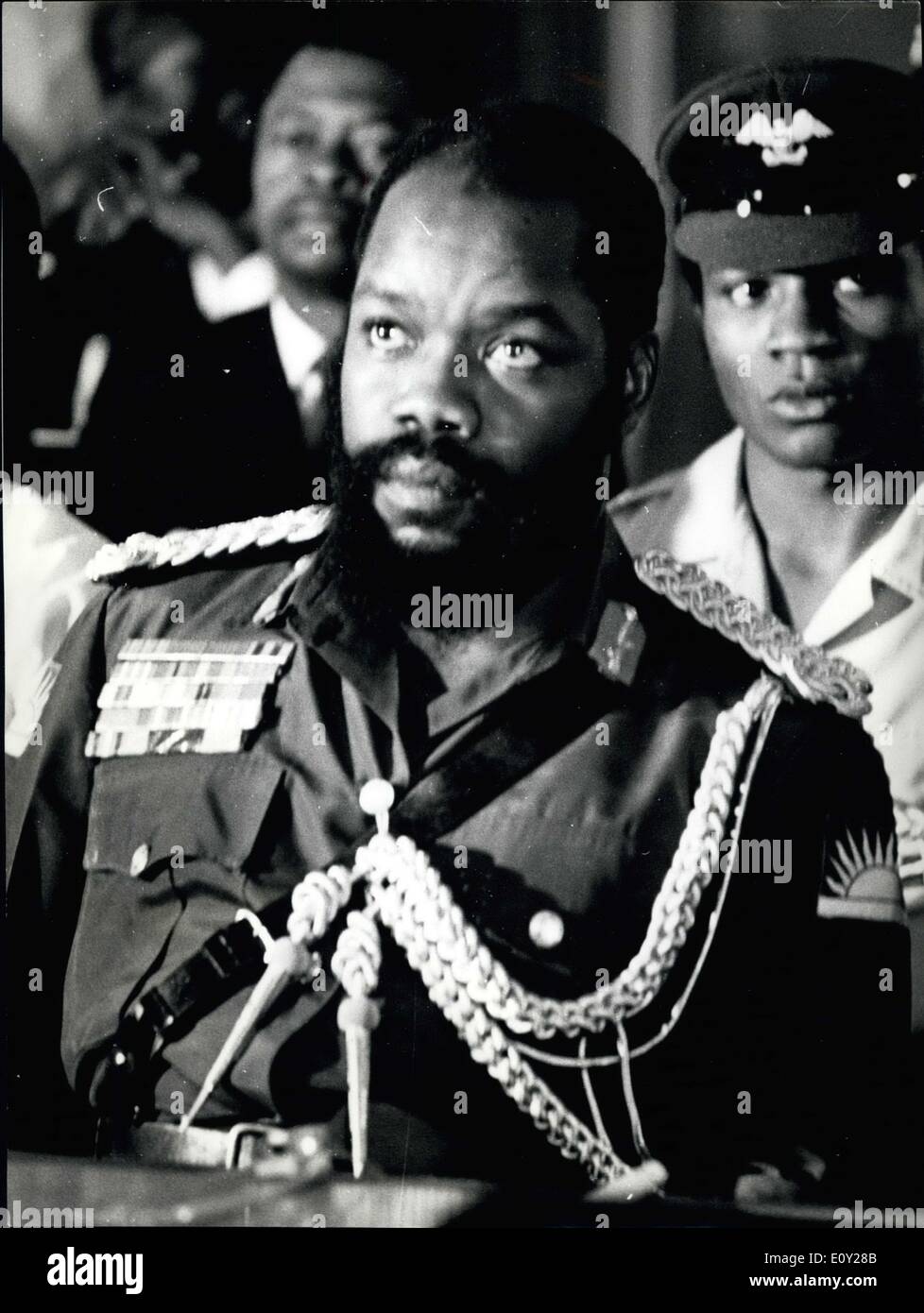 Aug. 22, 1968 - Leader Of Biafra, Col Odumegwu Ojukwu: at peace holds in Adolis Abbelo. ne Z Stock Photohttps://www.alamy.com/image-license-details/?v=1https://www.alamy.com/aug-22-1968-leader-of-biafra-col-odumegwu-ojukwu-at-peace-holds-in-image69435979.html
Aug. 22, 1968 - Leader Of Biafra, Col Odumegwu Ojukwu: at peace holds in Adolis Abbelo. ne Z Stock Photohttps://www.alamy.com/image-license-details/?v=1https://www.alamy.com/aug-22-1968-leader-of-biafra-col-odumegwu-ojukwu-at-peace-holds-in-image69435979.htmlRME0Y28B–Aug. 22, 1968 - Leader Of Biafra, Col Odumegwu Ojukwu: at peace holds in Adolis Abbelo. ne Z
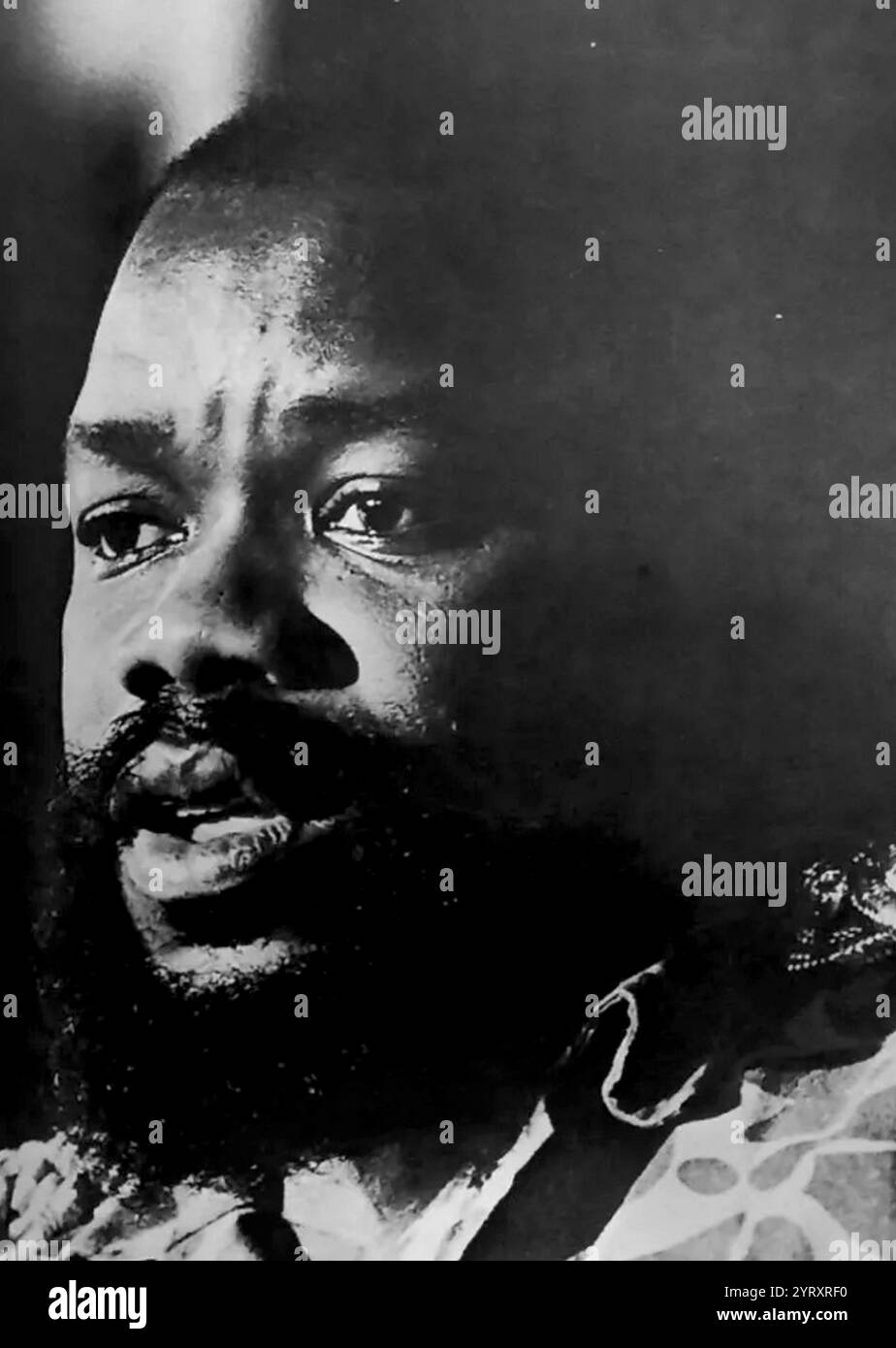 Chukwuemeka 'Emeka' Odumegwu Ojukwu (1933 ? 2011) Nigerian military officer and politician who served as President of the Republic of Biafra from 1967 to 1970 during the Nigerian Civil War. He previously served as military governor of the Eastern Region of Nigeria, which he declared as the independent state of Biafra Stock Photohttps://www.alamy.com/image-license-details/?v=1https://www.alamy.com/chukwuemeka-emeka-odumegwu-ojukwu-1933-2011-nigerian-military-officer-and-politician-who-served-as-president-of-the-republic-of-biafra-from-1967-to-1970-during-the-nigerian-civil-war-he-previously-served-as-military-governor-of-the-eastern-region-of-nigeria-which-he-declared-as-the-independent-state-of-biafra-image634299540.html
Chukwuemeka 'Emeka' Odumegwu Ojukwu (1933 ? 2011) Nigerian military officer and politician who served as President of the Republic of Biafra from 1967 to 1970 during the Nigerian Civil War. He previously served as military governor of the Eastern Region of Nigeria, which he declared as the independent state of Biafra Stock Photohttps://www.alamy.com/image-license-details/?v=1https://www.alamy.com/chukwuemeka-emeka-odumegwu-ojukwu-1933-2011-nigerian-military-officer-and-politician-who-served-as-president-of-the-republic-of-biafra-from-1967-to-1970-during-the-nigerian-civil-war-he-previously-served-as-military-governor-of-the-eastern-region-of-nigeria-which-he-declared-as-the-independent-state-of-biafra-image634299540.htmlRM2YRXRF0–Chukwuemeka 'Emeka' Odumegwu Ojukwu (1933 ? 2011) Nigerian military officer and politician who served as President of the Republic of Biafra from 1967 to 1970 during the Nigerian Civil War. He previously served as military governor of the Eastern Region of Nigeria, which he declared as the independent state of Biafra
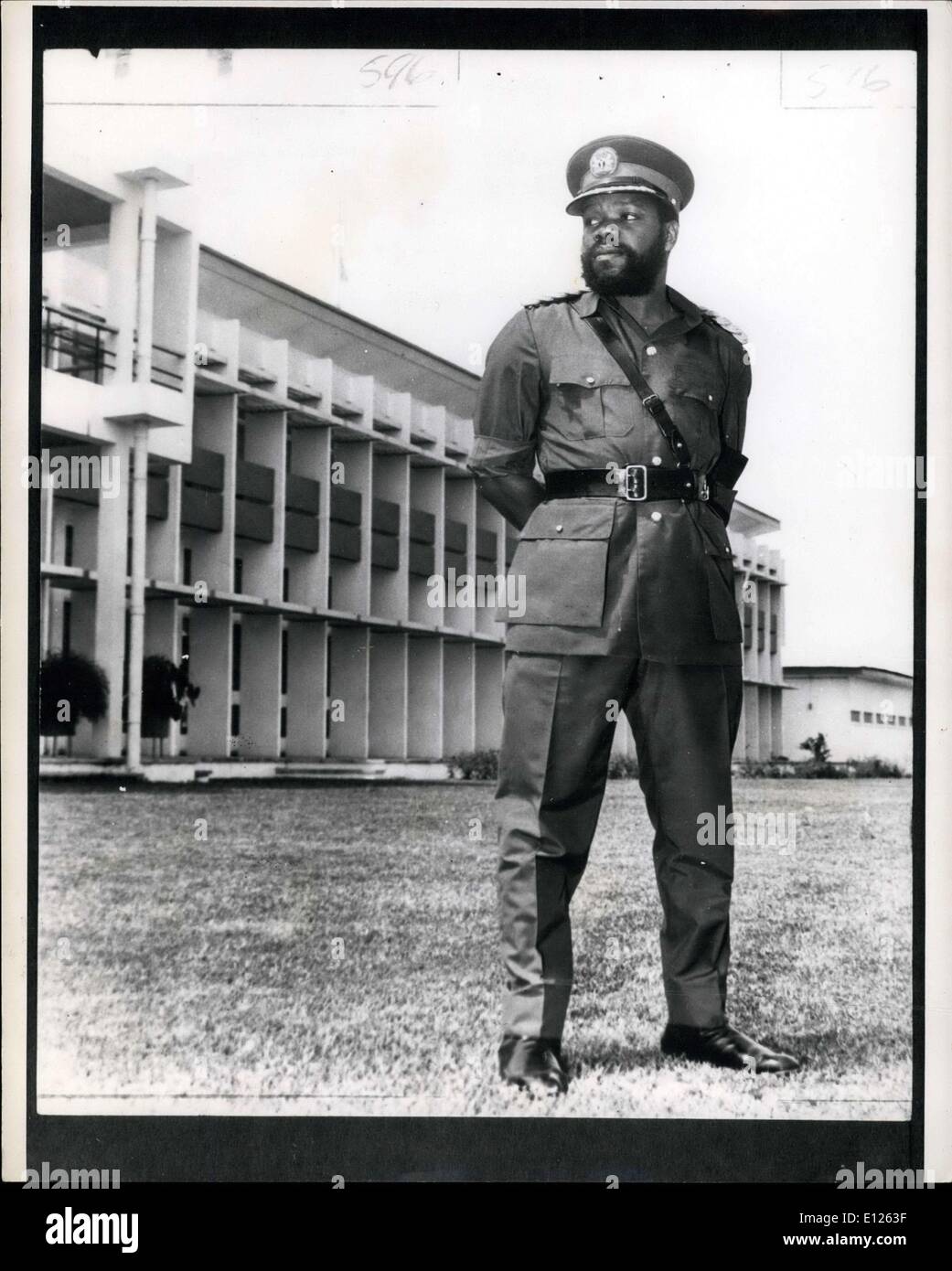 Mar. 19, 1989 - Col. Odumegwu Ojukwu: Military Governor of Eastern Nigeeria, Biafra. Stock Photohttps://www.alamy.com/image-license-details/?v=1https://www.alamy.com/mar-19-1989-col-odumegwu-ojukwu-military-governor-of-eastern-nigeeria-image69504835.html
Mar. 19, 1989 - Col. Odumegwu Ojukwu: Military Governor of Eastern Nigeeria, Biafra. Stock Photohttps://www.alamy.com/image-license-details/?v=1https://www.alamy.com/mar-19-1989-col-odumegwu-ojukwu-military-governor-of-eastern-nigeeria-image69504835.htmlRME1263F–Mar. 19, 1989 - Col. Odumegwu Ojukwu: Military Governor of Eastern Nigeeria, Biafra.
 LT Col Odumegwu Ojukwu , the military leader of Biafra holding aloft the new Biafran stamps and currency here at a meeting of the Consultative Assembly . The move followed one by the Nigerian Federal Government changing its currency to hit the breakaway Biafrans . 7 August 1968 Stock Photohttps://www.alamy.com/image-license-details/?v=1https://www.alamy.com/lt-col-odumegwu-ojukwu-the-military-leader-of-biafra-holding-aloft-the-new-biafran-stamps-and-currency-here-at-a-meeting-of-the-consultative-assembly-the-move-followed-one-by-the-nigerian-federal-government-changing-its-currency-to-hit-the-breakaway-biafrans-7-august-1968-image623893298.html
LT Col Odumegwu Ojukwu , the military leader of Biafra holding aloft the new Biafran stamps and currency here at a meeting of the Consultative Assembly . The move followed one by the Nigerian Federal Government changing its currency to hit the breakaway Biafrans . 7 August 1968 Stock Photohttps://www.alamy.com/image-license-details/?v=1https://www.alamy.com/lt-col-odumegwu-ojukwu-the-military-leader-of-biafra-holding-aloft-the-new-biafran-stamps-and-currency-here-at-a-meeting-of-the-consultative-assembly-the-move-followed-one-by-the-nigerian-federal-government-changing-its-currency-to-hit-the-breakaway-biafrans-7-august-1968-image623893298.htmlRM2Y70P7E–LT Col Odumegwu Ojukwu , the military leader of Biafra holding aloft the new Biafran stamps and currency here at a meeting of the Consultative Assembly . The move followed one by the Nigerian Federal Government changing its currency to hit the breakaway Biafrans . 7 August 1968
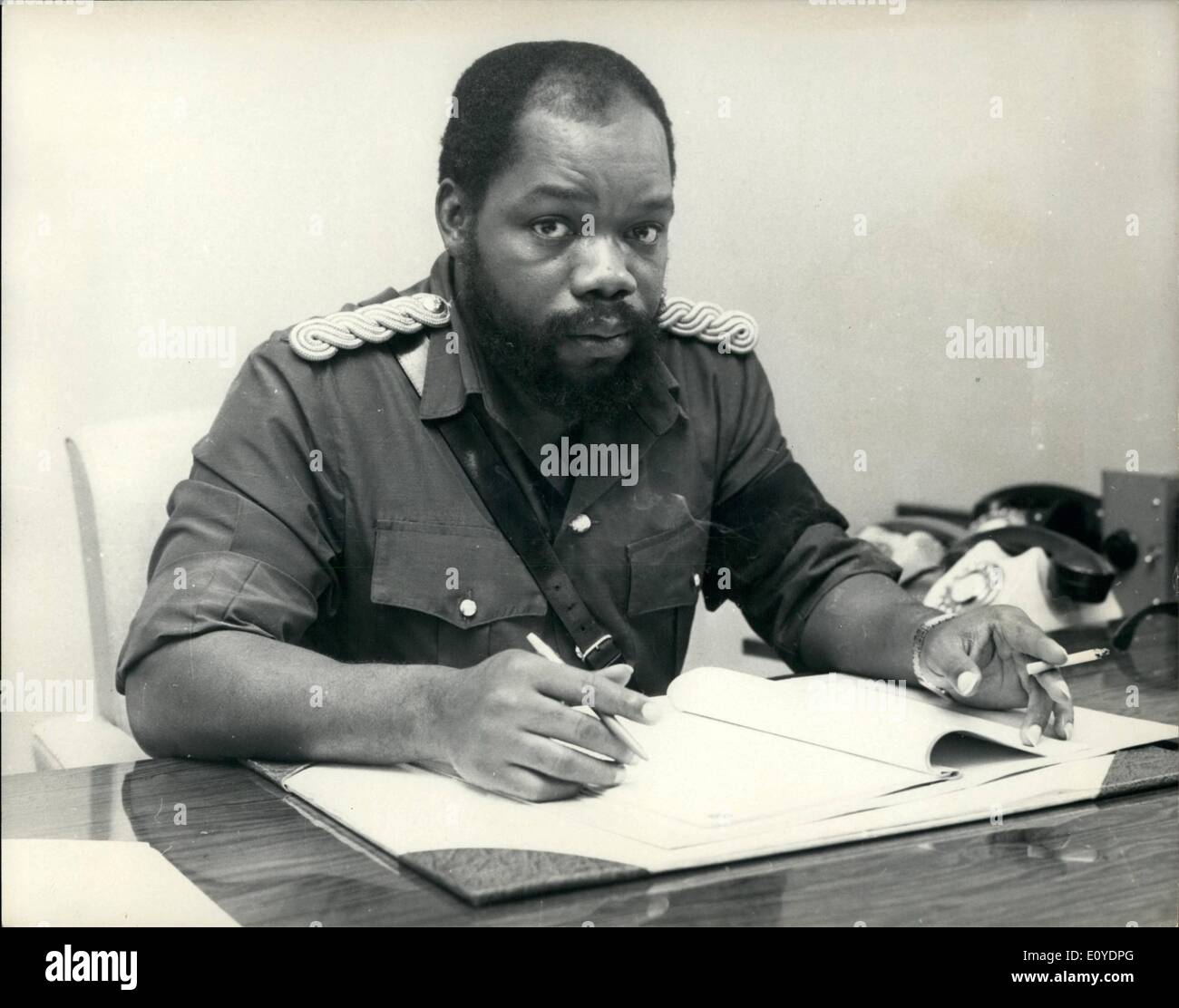 Dec. 12, 1969 - General Ojukwu Agrees to peace talks.: Biafran leader General Odumegwu Ojukwu announced today that he had agreed to immediate peace talks with Federal Nigeria in the Ethiopian capital of Addis Ababa. Photo shows A hitharto unissued picture of General Ojukwu. Stock Photohttps://www.alamy.com/image-license-details/?v=1https://www.alamy.com/dec-12-1969-general-ojukwu-agrees-to-peace-talks-biafran-leader-general-image69445000.html
Dec. 12, 1969 - General Ojukwu Agrees to peace talks.: Biafran leader General Odumegwu Ojukwu announced today that he had agreed to immediate peace talks with Federal Nigeria in the Ethiopian capital of Addis Ababa. Photo shows A hitharto unissued picture of General Ojukwu. Stock Photohttps://www.alamy.com/image-license-details/?v=1https://www.alamy.com/dec-12-1969-general-ojukwu-agrees-to-peace-talks-biafran-leader-general-image69445000.htmlRME0YDPG–Dec. 12, 1969 - General Ojukwu Agrees to peace talks.: Biafran leader General Odumegwu Ojukwu announced today that he had agreed to immediate peace talks with Federal Nigeria in the Ethiopian capital of Addis Ababa. Photo shows A hitharto unissued picture of General Ojukwu.
 Colonel Odumegwu Ojukwu, the Military Governor of Biafra in Nigeria inspecting some of his troops. 11th June 1968. The Nigerian Civil War, also known as the Biafran War endured for two and a half years, from 6 July 1967 to 15 January 1970, and was fought to counter the secession of Biafra from Nigeria. The indigenous Igbo people of Biafra felt they could no longer co-exist with the Northern-dominated federal government following independence from Great Britain. Political, economic, ethnic, cultural and religious tensions finally boiled over into civil war following the 1966 military coup, th Stock Photohttps://www.alamy.com/image-license-details/?v=1https://www.alamy.com/colonel-odumegwu-ojukwu-the-military-governor-of-biafra-in-nigeria-inspecting-some-of-his-troops-11th-june-1968-the-nigerian-civil-war-also-known-as-the-biafran-war-endured-for-two-and-a-half-years-from-6-july-1967-to-15-january-1970-and-was-fought-to-counter-the-secession-of-biafra-from-nigeria-the-indigenous-igbo-people-of-biafra-felt-they-could-no-longer-co-exist-with-the-northern-dominated-federal-government-following-independence-from-great-britain-political-economic-ethnic-cultural-and-religious-tensions-finally-boiled-over-into-civil-war-following-the-1966-military-coup-th-image462955832.html
Colonel Odumegwu Ojukwu, the Military Governor of Biafra in Nigeria inspecting some of his troops. 11th June 1968. The Nigerian Civil War, also known as the Biafran War endured for two and a half years, from 6 July 1967 to 15 January 1970, and was fought to counter the secession of Biafra from Nigeria. The indigenous Igbo people of Biafra felt they could no longer co-exist with the Northern-dominated federal government following independence from Great Britain. Political, economic, ethnic, cultural and religious tensions finally boiled over into civil war following the 1966 military coup, th Stock Photohttps://www.alamy.com/image-license-details/?v=1https://www.alamy.com/colonel-odumegwu-ojukwu-the-military-governor-of-biafra-in-nigeria-inspecting-some-of-his-troops-11th-june-1968-the-nigerian-civil-war-also-known-as-the-biafran-war-endured-for-two-and-a-half-years-from-6-july-1967-to-15-january-1970-and-was-fought-to-counter-the-secession-of-biafra-from-nigeria-the-indigenous-igbo-people-of-biafra-felt-they-could-no-longer-co-exist-with-the-northern-dominated-federal-government-following-independence-from-great-britain-political-economic-ethnic-cultural-and-religious-tensions-finally-boiled-over-into-civil-war-following-the-1966-military-coup-th-image462955832.htmlRM2HW5CTT–Colonel Odumegwu Ojukwu, the Military Governor of Biafra in Nigeria inspecting some of his troops. 11th June 1968. The Nigerian Civil War, also known as the Biafran War endured for two and a half years, from 6 July 1967 to 15 January 1970, and was fought to counter the secession of Biafra from Nigeria. The indigenous Igbo people of Biafra felt they could no longer co-exist with the Northern-dominated federal government following independence from Great Britain. Political, economic, ethnic, cultural and religious tensions finally boiled over into civil war following the 1966 military coup, th
 Feb. 26, 2012 - Eastern Nigeria’s Military Governor – A Portrait: Lieutenant – Colonel Odumegwu Ojukwu Bor Stock Photohttps://www.alamy.com/image-license-details/?v=1https://www.alamy.com/feb-26-2012-eastern-nigerias-military-governor-a-portrait-lieutenant-image69525269.html
Feb. 26, 2012 - Eastern Nigeria’s Military Governor – A Portrait: Lieutenant – Colonel Odumegwu Ojukwu Bor Stock Photohttps://www.alamy.com/image-license-details/?v=1https://www.alamy.com/feb-26-2012-eastern-nigerias-military-governor-a-portrait-lieutenant-image69525269.htmlRME13459–Feb. 26, 2012 - Eastern Nigeria’s Military Governor – A Portrait: Lieutenant – Colonel Odumegwu Ojukwu Bor
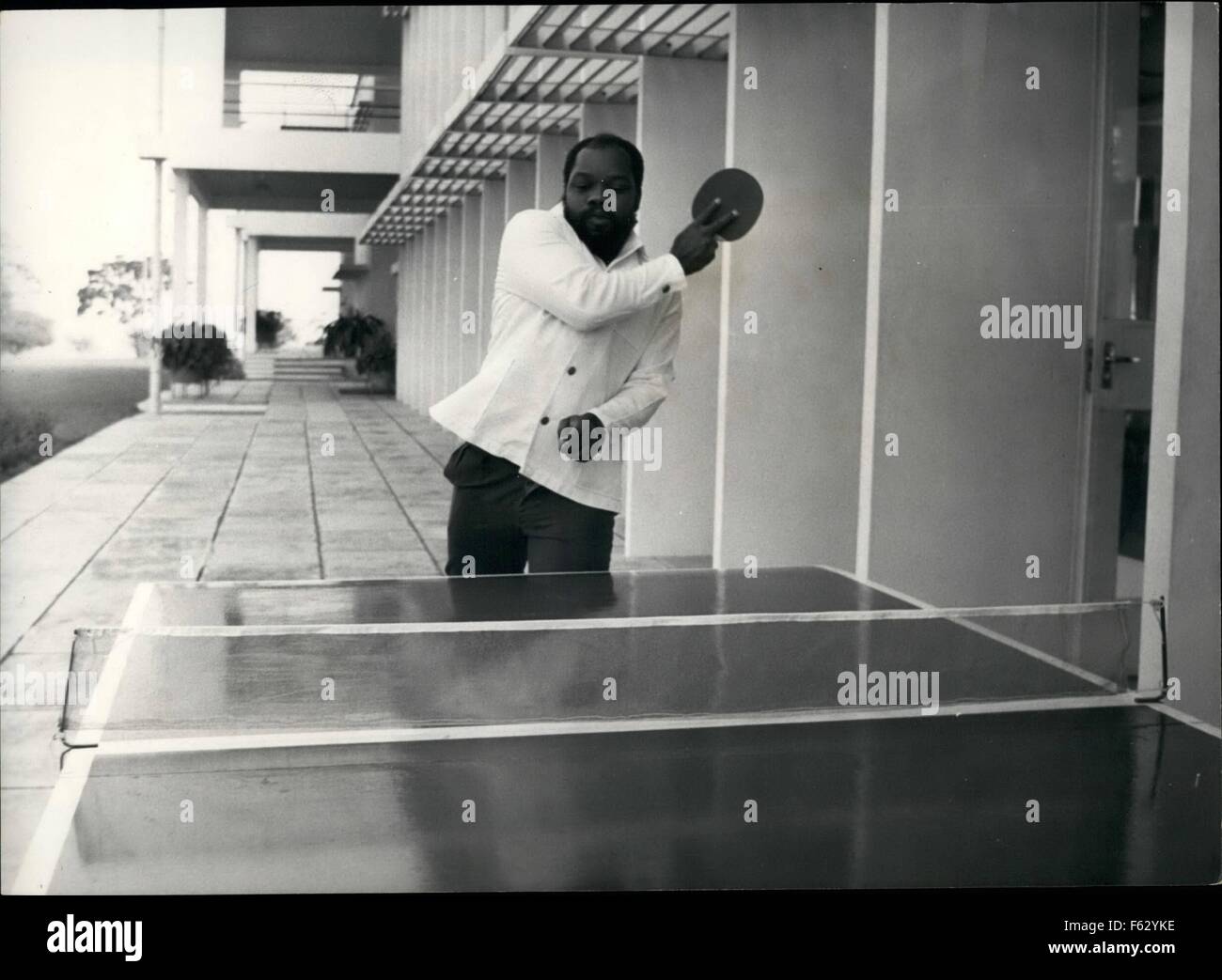 1965 - Eastern Nigeria Military Governor à A Portrait: Lieutenant Colonel Odumegwu Ojukwu (Born 1933) received his early schooling at Lagos. In 1944 he went to Epsom College. Surrey and From there proceeded to Lincoln College, Oxford where he read Modern History. He returned to his native country in 1955 and joined the Eastern Nigerian Public Service as an administrative Officer. In 1957 Odumegwu Ojukwu joined the Nigerian Army and after a brief training period at the Army depot at Zaris he went to England to undergo an Officers Training school in Tashia Ghana where he taught officer cadets ta Stock Photohttps://www.alamy.com/image-license-details/?v=1https://www.alamy.com/stock-photo-1965-eastern-nigeria-military-governor-a-portrait-lieutenant-colonel-89805394.html
1965 - Eastern Nigeria Military Governor à A Portrait: Lieutenant Colonel Odumegwu Ojukwu (Born 1933) received his early schooling at Lagos. In 1944 he went to Epsom College. Surrey and From there proceeded to Lincoln College, Oxford where he read Modern History. He returned to his native country in 1955 and joined the Eastern Nigerian Public Service as an administrative Officer. In 1957 Odumegwu Ojukwu joined the Nigerian Army and after a brief training period at the Army depot at Zaris he went to England to undergo an Officers Training school in Tashia Ghana where he taught officer cadets ta Stock Photohttps://www.alamy.com/image-license-details/?v=1https://www.alamy.com/stock-photo-1965-eastern-nigeria-military-governor-a-portrait-lieutenant-colonel-89805394.htmlRMF62YKE–1965 - Eastern Nigeria Military Governor à A Portrait: Lieutenant Colonel Odumegwu Ojukwu (Born 1933) received his early schooling at Lagos. In 1944 he went to Epsom College. Surrey and From there proceeded to Lincoln College, Oxford where he read Modern History. He returned to his native country in 1955 and joined the Eastern Nigerian Public Service as an administrative Officer. In 1957 Odumegwu Ojukwu joined the Nigerian Army and after a brief training period at the Army depot at Zaris he went to England to undergo an Officers Training school in Tashia Ghana where he taught officer cadets ta
 Biafran leader Colonel Ojukwu at the Addis Ababa Peace Conference which opened on 5 August 1968 , in the Ethopian capital under the Chairmanship of Emperor Haile Selassie . The talks between Nigeria and the break away state of Biafra have been arranged by the Organisation of African Unity . Yesterday , Col Ojukwu in a two hour opening speech , maintained Biafra's right to sucede . 7 August 1968 Stock Photohttps://www.alamy.com/image-license-details/?v=1https://www.alamy.com/biafran-leader-colonel-ojukwu-at-the-addis-ababa-peace-conference-which-opened-on-5-august-1968-in-the-ethopian-capital-under-the-chairmanship-of-emperor-haile-selassie-the-talks-between-nigeria-and-the-break-away-state-of-biafra-have-been-arranged-by-the-organisation-of-african-unity-yesterday-col-ojukwu-in-a-two-hour-opening-speech-maintained-biafras-right-to-sucede-7-august-1968-image623893297.html
Biafran leader Colonel Ojukwu at the Addis Ababa Peace Conference which opened on 5 August 1968 , in the Ethopian capital under the Chairmanship of Emperor Haile Selassie . The talks between Nigeria and the break away state of Biafra have been arranged by the Organisation of African Unity . Yesterday , Col Ojukwu in a two hour opening speech , maintained Biafra's right to sucede . 7 August 1968 Stock Photohttps://www.alamy.com/image-license-details/?v=1https://www.alamy.com/biafran-leader-colonel-ojukwu-at-the-addis-ababa-peace-conference-which-opened-on-5-august-1968-in-the-ethopian-capital-under-the-chairmanship-of-emperor-haile-selassie-the-talks-between-nigeria-and-the-break-away-state-of-biafra-have-been-arranged-by-the-organisation-of-african-unity-yesterday-col-ojukwu-in-a-two-hour-opening-speech-maintained-biafras-right-to-sucede-7-august-1968-image623893297.htmlRM2Y70P7D–Biafran leader Colonel Ojukwu at the Addis Ababa Peace Conference which opened on 5 August 1968 , in the Ethopian capital under the Chairmanship of Emperor Haile Selassie . The talks between Nigeria and the break away state of Biafra have been arranged by the Organisation of African Unity . Yesterday , Col Ojukwu in a two hour opening speech , maintained Biafra's right to sucede . 7 August 1968
 The former head of Nigeria's Military Government and Supreme Commander of the Armed Forces , Major General Aguiyi Ironsi , who died in the military coup of 29 July 1966 , was accorded a state funeral with full military honours on 20 January 1967 . The ceremony took place in his home town , Umuahia-Ibeku , Eastern Nigeria . This picture shows Ironsi's parents , wife Mrs Victoria Ironsi ( in black , behind children ) ; East Nigeria Military Governor Lt Col Ojukwu and other mourners at the graveside , with the coffin ( foreground ). 24 January 1967 Stock Photohttps://www.alamy.com/image-license-details/?v=1https://www.alamy.com/the-former-head-of-nigerias-military-government-and-supreme-commander-of-the-armed-forces-major-general-aguiyi-ironsi-who-died-in-the-military-coup-of-29-july-1966-was-accorded-a-state-funeral-with-full-military-honours-on-20-january-1967-the-ceremony-took-place-in-his-home-town-umuahia-ibeku-eastern-nigeria-this-picture-shows-ironsis-parents-wife-mrs-victoria-ironsi-in-black-behind-children-east-nigeria-military-governor-lt-col-ojukwu-and-other-mourners-at-the-graveside-with-the-coffin-foreground-24-january-1967-image623893441.html
The former head of Nigeria's Military Government and Supreme Commander of the Armed Forces , Major General Aguiyi Ironsi , who died in the military coup of 29 July 1966 , was accorded a state funeral with full military honours on 20 January 1967 . The ceremony took place in his home town , Umuahia-Ibeku , Eastern Nigeria . This picture shows Ironsi's parents , wife Mrs Victoria Ironsi ( in black , behind children ) ; East Nigeria Military Governor Lt Col Ojukwu and other mourners at the graveside , with the coffin ( foreground ). 24 January 1967 Stock Photohttps://www.alamy.com/image-license-details/?v=1https://www.alamy.com/the-former-head-of-nigerias-military-government-and-supreme-commander-of-the-armed-forces-major-general-aguiyi-ironsi-who-died-in-the-military-coup-of-29-july-1966-was-accorded-a-state-funeral-with-full-military-honours-on-20-january-1967-the-ceremony-took-place-in-his-home-town-umuahia-ibeku-eastern-nigeria-this-picture-shows-ironsis-parents-wife-mrs-victoria-ironsi-in-black-behind-children-east-nigeria-military-governor-lt-col-ojukwu-and-other-mourners-at-the-graveside-with-the-coffin-foreground-24-january-1967-image623893441.htmlRM2Y70PCH–The former head of Nigeria's Military Government and Supreme Commander of the Armed Forces , Major General Aguiyi Ironsi , who died in the military coup of 29 July 1966 , was accorded a state funeral with full military honours on 20 January 1967 . The ceremony took place in his home town , Umuahia-Ibeku , Eastern Nigeria . This picture shows Ironsi's parents , wife Mrs Victoria Ironsi ( in black , behind children ) ; East Nigeria Military Governor Lt Col Ojukwu and other mourners at the graveside , with the coffin ( foreground ). 24 January 1967
 media coverage of the Biafran Famine during the he Nigerian Civil War (1967 ? 15 January 1970), known as the Biafran War, was fought between Nigeria and the Republic of Biafra, a secessionist state which had declared its independence from Nigeria in 1967. Nigeria was led by General Yakubu Gowon, and Biafra by Lieutenant Colonel Chukwuemeka 'Emeka' Odumegwu Ojukwu. The conflict resulted from political, ethnic, cultural and religious tensions which preceded the United Kingdom's formal decolonisation of Nigeria from 1960 to 1963. Immediate causes of the war in 1966 included a military coup, count Stock Photohttps://www.alamy.com/image-license-details/?v=1https://www.alamy.com/media-coverage-of-the-biafran-famine-during-the-he-nigerian-civil-war-1967-15-january-1970-known-as-the-biafran-war-was-fought-between-nigeria-and-the-republic-of-biafra-a-secessionist-state-which-had-declared-its-independence-from-nigeria-in-1967-nigeria-was-led-by-general-yakubu-gowon-and-biafra-by-lieutenant-colonel-chukwuemeka-emeka-odumegwu-ojukwu-the-conflict-resulted-from-political-ethnic-cultural-and-religious-tensions-which-preceded-the-united-kingdoms-formal-decolonisation-of-nigeria-from-1960-to-1963-immediate-causes-of-the-war-in-1966-included-a-military-coup-count-image634299568.html
media coverage of the Biafran Famine during the he Nigerian Civil War (1967 ? 15 January 1970), known as the Biafran War, was fought between Nigeria and the Republic of Biafra, a secessionist state which had declared its independence from Nigeria in 1967. Nigeria was led by General Yakubu Gowon, and Biafra by Lieutenant Colonel Chukwuemeka 'Emeka' Odumegwu Ojukwu. The conflict resulted from political, ethnic, cultural and religious tensions which preceded the United Kingdom's formal decolonisation of Nigeria from 1960 to 1963. Immediate causes of the war in 1966 included a military coup, count Stock Photohttps://www.alamy.com/image-license-details/?v=1https://www.alamy.com/media-coverage-of-the-biafran-famine-during-the-he-nigerian-civil-war-1967-15-january-1970-known-as-the-biafran-war-was-fought-between-nigeria-and-the-republic-of-biafra-a-secessionist-state-which-had-declared-its-independence-from-nigeria-in-1967-nigeria-was-led-by-general-yakubu-gowon-and-biafra-by-lieutenant-colonel-chukwuemeka-emeka-odumegwu-ojukwu-the-conflict-resulted-from-political-ethnic-cultural-and-religious-tensions-which-preceded-the-united-kingdoms-formal-decolonisation-of-nigeria-from-1960-to-1963-immediate-causes-of-the-war-in-1966-included-a-military-coup-count-image634299568.htmlRM2YRXRG0–media coverage of the Biafran Famine during the he Nigerian Civil War (1967 ? 15 January 1970), known as the Biafran War, was fought between Nigeria and the Republic of Biafra, a secessionist state which had declared its independence from Nigeria in 1967. Nigeria was led by General Yakubu Gowon, and Biafra by Lieutenant Colonel Chukwuemeka 'Emeka' Odumegwu Ojukwu. The conflict resulted from political, ethnic, cultural and religious tensions which preceded the United Kingdom's formal decolonisation of Nigeria from 1960 to 1963. Immediate causes of the war in 1966 included a military coup, count
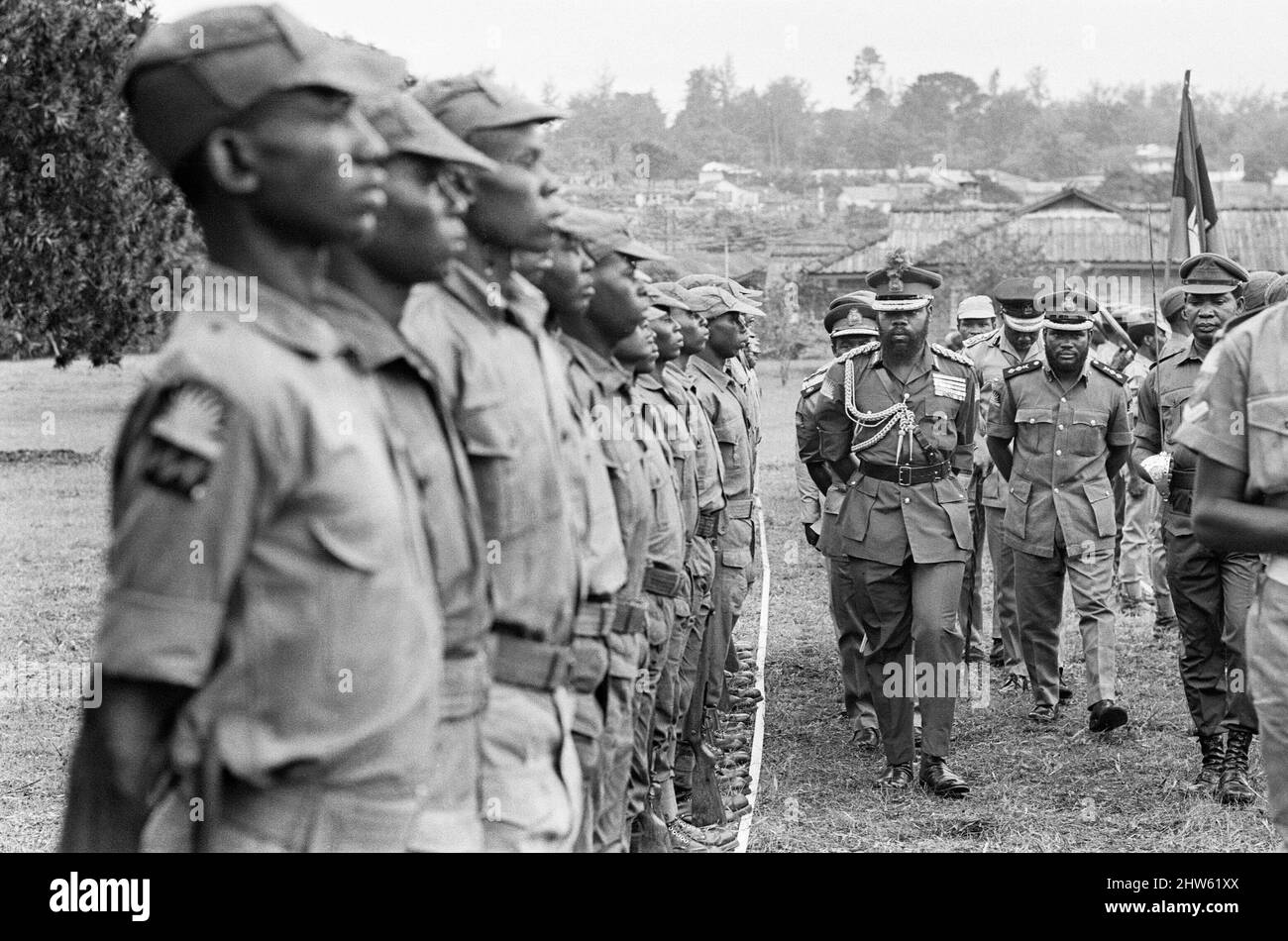 Biafran soldiers line up for inspection by Colonel Odumegwu Ojukwu, the Military Governor of Biafra in Nigeria. 11th June 1968. The Nigerian Civil War, also known as the Biafran War endured for two and a half years, from 6 July 1967 to 15 January 1970, and was fought to counter the secession of Biafra from Nigeria. The indigenous Igbo people of Biafra felt they could no longer co-exist with the Northern-dominated federal government following independence from Great Britain. Political, economic, ethnic, cultural and religious tensions finally boiled over into civil war following the 1966 mil Stock Photohttps://www.alamy.com/image-license-details/?v=1https://www.alamy.com/biafran-soldiers-line-up-for-inspection-by-colonel-odumegwu-ojukwu-the-military-governor-of-biafra-in-nigeria-11th-june-1968-the-nigerian-civil-war-also-known-as-the-biafran-war-endured-for-two-and-a-half-years-from-6-july-1967-to-15-january-1970-and-was-fought-to-counter-the-secession-of-biafra-from-nigeria-the-indigenous-igbo-people-of-biafra-felt-they-could-no-longer-co-exist-with-the-northern-dominated-federal-government-following-independence-from-great-britain-political-economic-ethnic-cultural-and-religious-tensions-finally-boiled-over-into-civil-war-following-the-1966-mil-image462969218.html
Biafran soldiers line up for inspection by Colonel Odumegwu Ojukwu, the Military Governor of Biafra in Nigeria. 11th June 1968. The Nigerian Civil War, also known as the Biafran War endured for two and a half years, from 6 July 1967 to 15 January 1970, and was fought to counter the secession of Biafra from Nigeria. The indigenous Igbo people of Biafra felt they could no longer co-exist with the Northern-dominated federal government following independence from Great Britain. Political, economic, ethnic, cultural and religious tensions finally boiled over into civil war following the 1966 mil Stock Photohttps://www.alamy.com/image-license-details/?v=1https://www.alamy.com/biafran-soldiers-line-up-for-inspection-by-colonel-odumegwu-ojukwu-the-military-governor-of-biafra-in-nigeria-11th-june-1968-the-nigerian-civil-war-also-known-as-the-biafran-war-endured-for-two-and-a-half-years-from-6-july-1967-to-15-january-1970-and-was-fought-to-counter-the-secession-of-biafra-from-nigeria-the-indigenous-igbo-people-of-biafra-felt-they-could-no-longer-co-exist-with-the-northern-dominated-federal-government-following-independence-from-great-britain-political-economic-ethnic-cultural-and-religious-tensions-finally-boiled-over-into-civil-war-following-the-1966-mil-image462969218.htmlRM2HW61XX–Biafran soldiers line up for inspection by Colonel Odumegwu Ojukwu, the Military Governor of Biafra in Nigeria. 11th June 1968. The Nigerian Civil War, also known as the Biafran War endured for two and a half years, from 6 July 1967 to 15 January 1970, and was fought to counter the secession of Biafra from Nigeria. The indigenous Igbo people of Biafra felt they could no longer co-exist with the Northern-dominated federal government following independence from Great Britain. Political, economic, ethnic, cultural and religious tensions finally boiled over into civil war following the 1966 mil
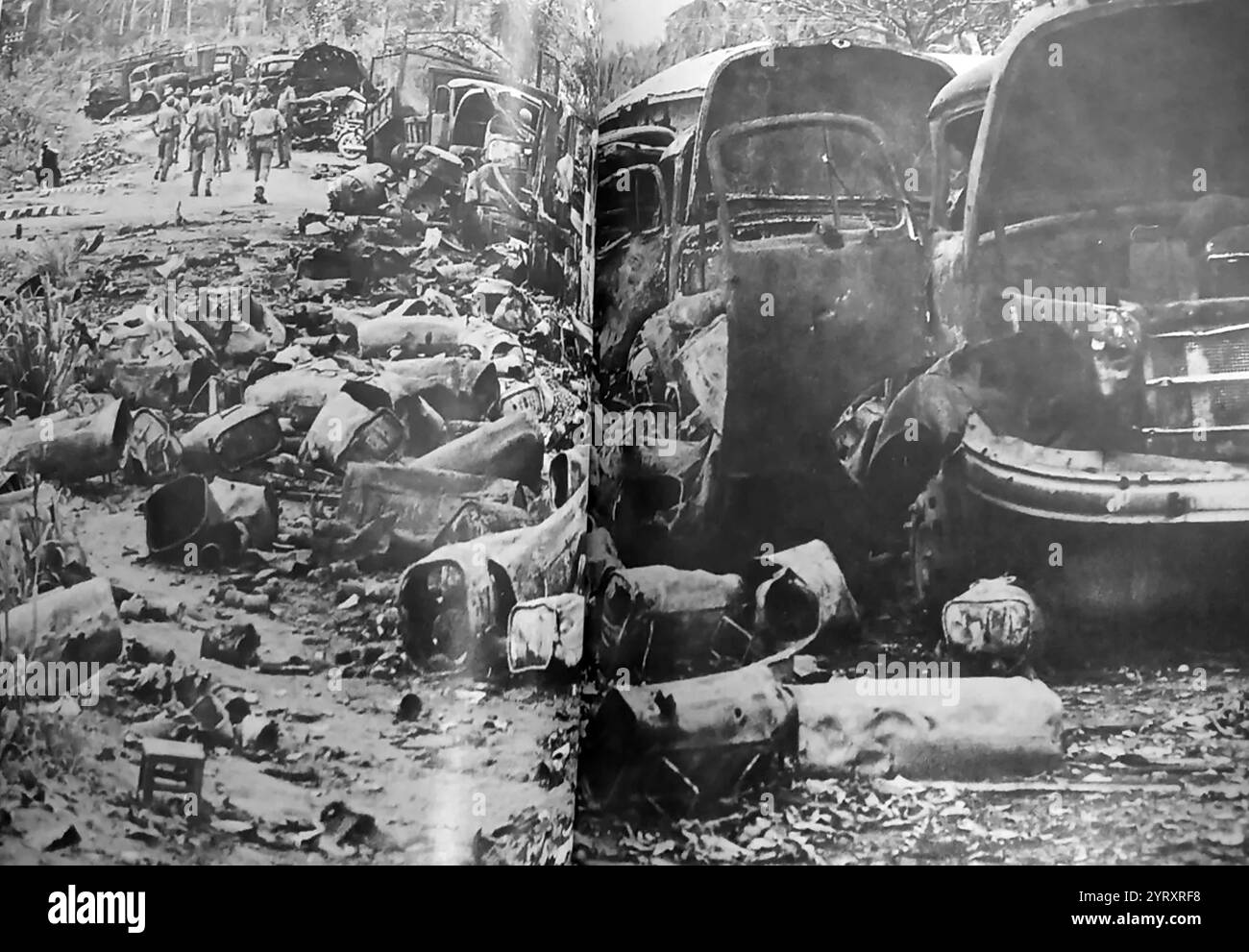 Federal army convoy destroyed by Biafran shelling during the Nigerian Civil War (1967 ? 15 January 1970), known as the Biafran War, was fought between Nigeria and the Republic of Biafra, a secessionist state which had declared its independence from Nigeria in 1967. Nigeria was led by General Yakubu Gowon, and Biafra by Lieutenant Colonel Chukwuemeka 'Emeka' Odumegwu Ojukwu. The conflict resulted from political, ethnic, cultural and religious tensions which preceded the United Kingdom's formal decolonisation of Nigeria from 1960 to 1963. Immediate causes of the war in 1966 included a military Stock Photohttps://www.alamy.com/image-license-details/?v=1https://www.alamy.com/federal-army-convoy-destroyed-by-biafran-shelling-during-the-nigerian-civil-war-1967-15-january-1970-known-as-the-biafran-war-was-fought-between-nigeria-and-the-republic-of-biafra-a-secessionist-state-which-had-declared-its-independence-from-nigeria-in-1967-nigeria-was-led-by-general-yakubu-gowon-and-biafra-by-lieutenant-colonel-chukwuemeka-emeka-odumegwu-ojukwu-the-conflict-resulted-from-political-ethnic-cultural-and-religious-tensions-which-preceded-the-united-kingdoms-formal-decolonisation-of-nigeria-from-1960-to-1963-immediate-causes-of-the-war-in-1966-included-a-military-image634299548.html
Federal army convoy destroyed by Biafran shelling during the Nigerian Civil War (1967 ? 15 January 1970), known as the Biafran War, was fought between Nigeria and the Republic of Biafra, a secessionist state which had declared its independence from Nigeria in 1967. Nigeria was led by General Yakubu Gowon, and Biafra by Lieutenant Colonel Chukwuemeka 'Emeka' Odumegwu Ojukwu. The conflict resulted from political, ethnic, cultural and religious tensions which preceded the United Kingdom's formal decolonisation of Nigeria from 1960 to 1963. Immediate causes of the war in 1966 included a military Stock Photohttps://www.alamy.com/image-license-details/?v=1https://www.alamy.com/federal-army-convoy-destroyed-by-biafran-shelling-during-the-nigerian-civil-war-1967-15-january-1970-known-as-the-biafran-war-was-fought-between-nigeria-and-the-republic-of-biafra-a-secessionist-state-which-had-declared-its-independence-from-nigeria-in-1967-nigeria-was-led-by-general-yakubu-gowon-and-biafra-by-lieutenant-colonel-chukwuemeka-emeka-odumegwu-ojukwu-the-conflict-resulted-from-political-ethnic-cultural-and-religious-tensions-which-preceded-the-united-kingdoms-formal-decolonisation-of-nigeria-from-1960-to-1963-immediate-causes-of-the-war-in-1966-included-a-military-image634299548.htmlRM2YRXRF8–Federal army convoy destroyed by Biafran shelling during the Nigerian Civil War (1967 ? 15 January 1970), known as the Biafran War, was fought between Nigeria and the Republic of Biafra, a secessionist state which had declared its independence from Nigeria in 1967. Nigeria was led by General Yakubu Gowon, and Biafra by Lieutenant Colonel Chukwuemeka 'Emeka' Odumegwu Ojukwu. The conflict resulted from political, ethnic, cultural and religious tensions which preceded the United Kingdom's formal decolonisation of Nigeria from 1960 to 1963. Immediate causes of the war in 1966 included a military
 Biafran soldiers line up for inspection by Colonel Odumegwu Ojukwu, the Military Governor of Biafra in Nigeria. 11th June 1968. The Nigerian Civil War, also known as the Biafran War endured for two and a half years, from 6 July 1967 to 15 January 1970, and was fought to counter the secession of Biafra from Nigeria. The indigenous Igbo people of Biafra felt they could no longer co-exist with the Northern-dominated federal government following independence from Great Britain. Political, economic, ethnic, cultural and religious tensions finally boiled over into civil war following the 1966 mil Stock Photohttps://www.alamy.com/image-license-details/?v=1https://www.alamy.com/biafran-soldiers-line-up-for-inspection-by-colonel-odumegwu-ojukwu-the-military-governor-of-biafra-in-nigeria-11th-june-1968-the-nigerian-civil-war-also-known-as-the-biafran-war-endured-for-two-and-a-half-years-from-6-july-1967-to-15-january-1970-and-was-fought-to-counter-the-secession-of-biafra-from-nigeria-the-indigenous-igbo-people-of-biafra-felt-they-could-no-longer-co-exist-with-the-northern-dominated-federal-government-following-independence-from-great-britain-political-economic-ethnic-cultural-and-religious-tensions-finally-boiled-over-into-civil-war-following-the-1966-mil-image462976029.html
Biafran soldiers line up for inspection by Colonel Odumegwu Ojukwu, the Military Governor of Biafra in Nigeria. 11th June 1968. The Nigerian Civil War, also known as the Biafran War endured for two and a half years, from 6 July 1967 to 15 January 1970, and was fought to counter the secession of Biafra from Nigeria. The indigenous Igbo people of Biafra felt they could no longer co-exist with the Northern-dominated federal government following independence from Great Britain. Political, economic, ethnic, cultural and religious tensions finally boiled over into civil war following the 1966 mil Stock Photohttps://www.alamy.com/image-license-details/?v=1https://www.alamy.com/biafran-soldiers-line-up-for-inspection-by-colonel-odumegwu-ojukwu-the-military-governor-of-biafra-in-nigeria-11th-june-1968-the-nigerian-civil-war-also-known-as-the-biafran-war-endured-for-two-and-a-half-years-from-6-july-1967-to-15-january-1970-and-was-fought-to-counter-the-secession-of-biafra-from-nigeria-the-indigenous-igbo-people-of-biafra-felt-they-could-no-longer-co-exist-with-the-northern-dominated-federal-government-following-independence-from-great-britain-political-economic-ethnic-cultural-and-religious-tensions-finally-boiled-over-into-civil-war-following-the-1966-mil-image462976029.htmlRM2HW6AJ5–Biafran soldiers line up for inspection by Colonel Odumegwu Ojukwu, the Military Governor of Biafra in Nigeria. 11th June 1968. The Nigerian Civil War, also known as the Biafran War endured for two and a half years, from 6 July 1967 to 15 January 1970, and was fought to counter the secession of Biafra from Nigeria. The indigenous Igbo people of Biafra felt they could no longer co-exist with the Northern-dominated federal government following independence from Great Britain. Political, economic, ethnic, cultural and religious tensions finally boiled over into civil war following the 1966 mil
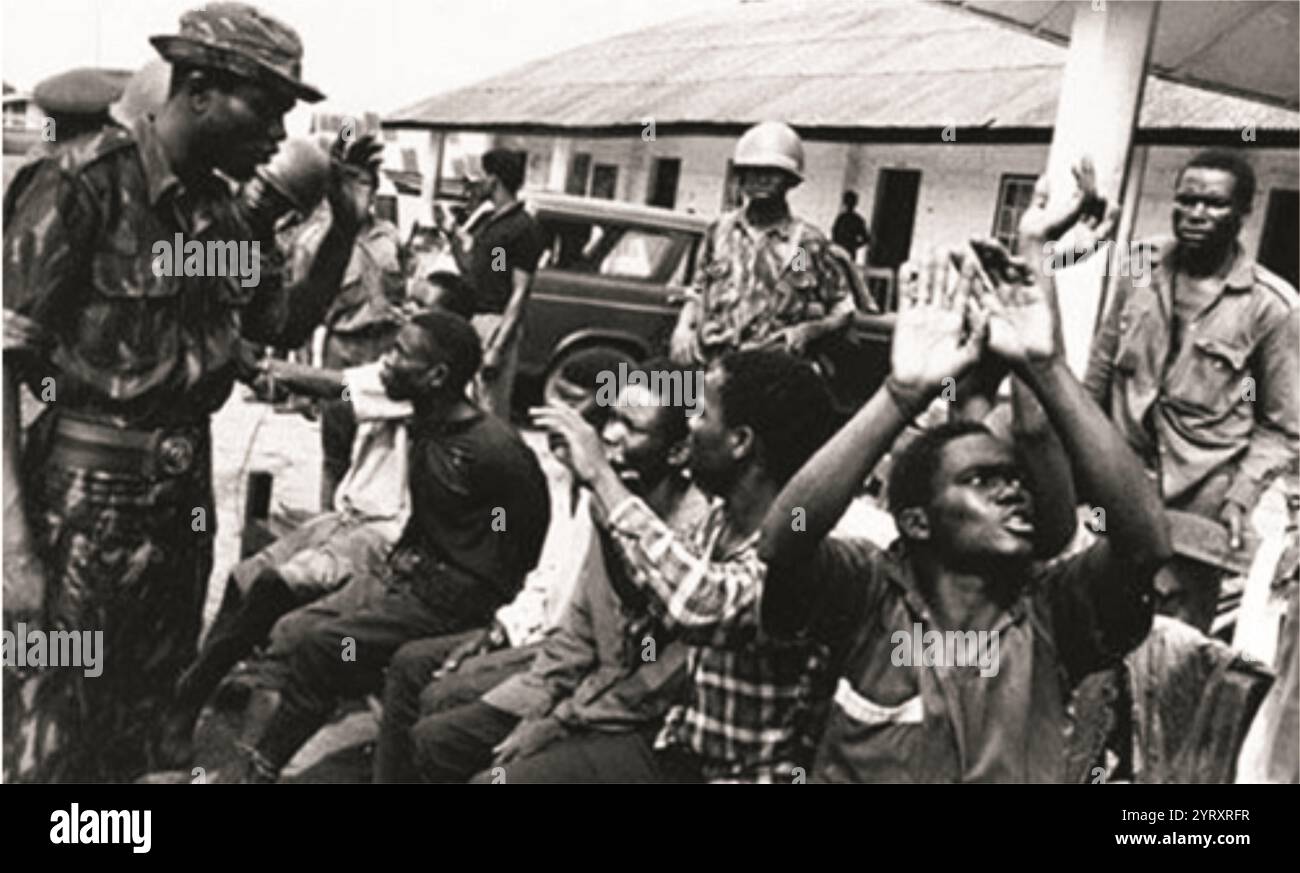 media coverage of the Biafran Famine during the he Nigerian Civil War (1967 ? 15 January 1970), known as the Biafran War, was fought between Nigeria and the Republic of Biafra, a secessionist state which had declared its independence from Nigeria in 1967. Nigeria was led by General Yakubu Gowon, and Biafra by Lieutenant Colonel Chukwuemeka 'Emeka' Odumegwu Ojukwu. The conflict resulted from political, ethnic, cultural and religious tensions which preceded the United Kingdom's formal decolonisation of Nigeria from 1960 to 1963. Immediate causes of the war in 1966 included a military coup, count Stock Photohttps://www.alamy.com/image-license-details/?v=1https://www.alamy.com/media-coverage-of-the-biafran-famine-during-the-he-nigerian-civil-war-1967-15-january-1970-known-as-the-biafran-war-was-fought-between-nigeria-and-the-republic-of-biafra-a-secessionist-state-which-had-declared-its-independence-from-nigeria-in-1967-nigeria-was-led-by-general-yakubu-gowon-and-biafra-by-lieutenant-colonel-chukwuemeka-emeka-odumegwu-ojukwu-the-conflict-resulted-from-political-ethnic-cultural-and-religious-tensions-which-preceded-the-united-kingdoms-formal-decolonisation-of-nigeria-from-1960-to-1963-immediate-causes-of-the-war-in-1966-included-a-military-coup-count-image634299563.html
media coverage of the Biafran Famine during the he Nigerian Civil War (1967 ? 15 January 1970), known as the Biafran War, was fought between Nigeria and the Republic of Biafra, a secessionist state which had declared its independence from Nigeria in 1967. Nigeria was led by General Yakubu Gowon, and Biafra by Lieutenant Colonel Chukwuemeka 'Emeka' Odumegwu Ojukwu. The conflict resulted from political, ethnic, cultural and religious tensions which preceded the United Kingdom's formal decolonisation of Nigeria from 1960 to 1963. Immediate causes of the war in 1966 included a military coup, count Stock Photohttps://www.alamy.com/image-license-details/?v=1https://www.alamy.com/media-coverage-of-the-biafran-famine-during-the-he-nigerian-civil-war-1967-15-january-1970-known-as-the-biafran-war-was-fought-between-nigeria-and-the-republic-of-biafra-a-secessionist-state-which-had-declared-its-independence-from-nigeria-in-1967-nigeria-was-led-by-general-yakubu-gowon-and-biafra-by-lieutenant-colonel-chukwuemeka-emeka-odumegwu-ojukwu-the-conflict-resulted-from-political-ethnic-cultural-and-religious-tensions-which-preceded-the-united-kingdoms-formal-decolonisation-of-nigeria-from-1960-to-1963-immediate-causes-of-the-war-in-1966-included-a-military-coup-count-image634299563.htmlRM2YRXRFR–media coverage of the Biafran Famine during the he Nigerian Civil War (1967 ? 15 January 1970), known as the Biafran War, was fought between Nigeria and the Republic of Biafra, a secessionist state which had declared its independence from Nigeria in 1967. Nigeria was led by General Yakubu Gowon, and Biafra by Lieutenant Colonel Chukwuemeka 'Emeka' Odumegwu Ojukwu. The conflict resulted from political, ethnic, cultural and religious tensions which preceded the United Kingdom's formal decolonisation of Nigeria from 1960 to 1963. Immediate causes of the war in 1966 included a military coup, count
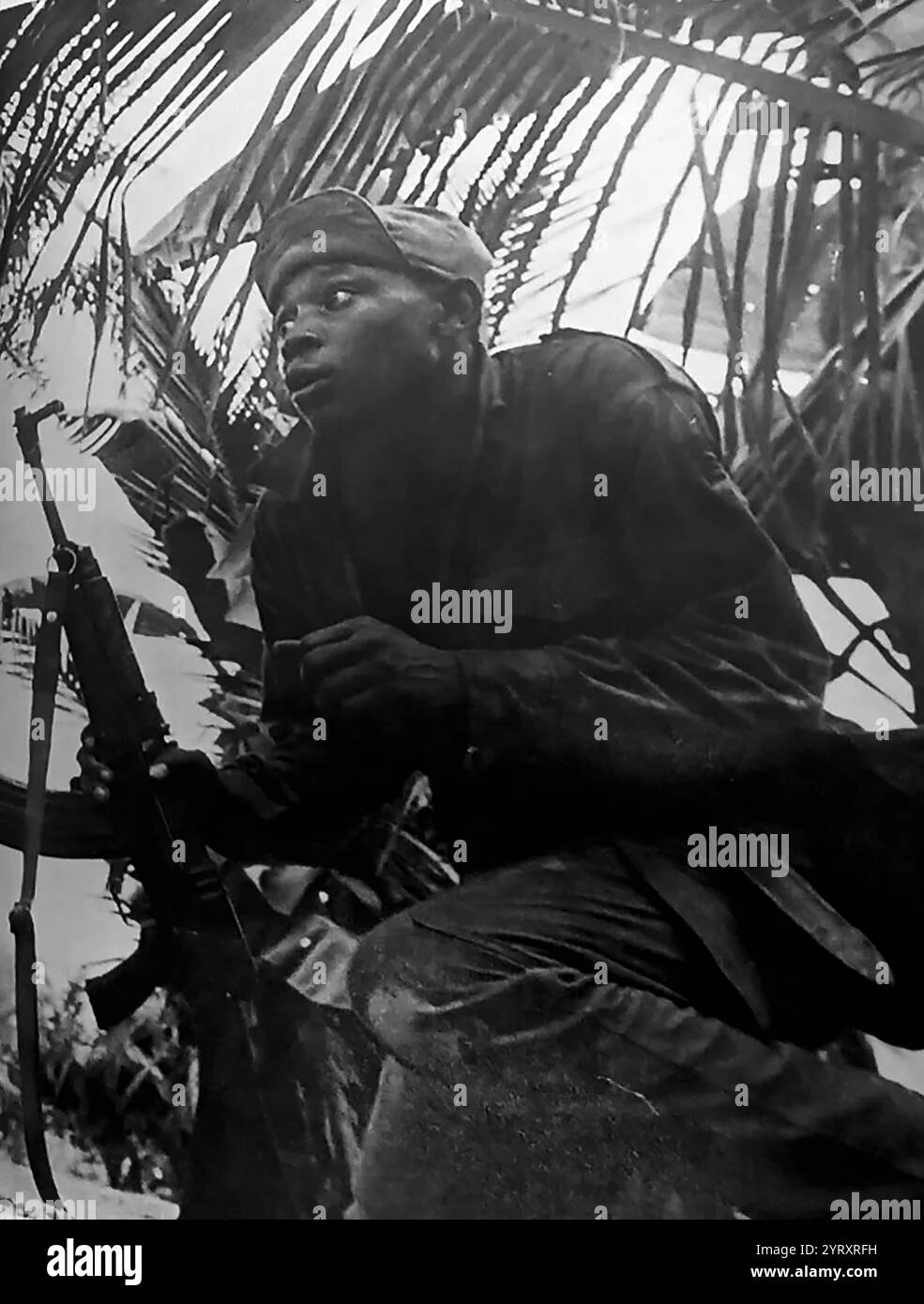 Biafran soldier during the Nigerian Civil War (1967 ? 15 January 1970), known as the Biafran War, was fought between Nigeria and the Republic of Biafra, a secessionist state which had declared its independence from Nigeria in 1967. Nigeria was led by General Yakubu Gowon, and Biafra by Lieutenant Colonel Chukwuemeka 'Emeka' Odumegwu Ojukwu. The conflict resulted from political, ethnic, cultural and religious tensions which preceded the United Kingdom's formal decolonisation of Nigeria from 1960 to 1963. Immediate causes of the war in 1966 included a military coup, counter coup, and anti Igbo p Stock Photohttps://www.alamy.com/image-license-details/?v=1https://www.alamy.com/biafran-soldier-during-the-nigerian-civil-war-1967-15-january-1970-known-as-the-biafran-war-was-fought-between-nigeria-and-the-republic-of-biafra-a-secessionist-state-which-had-declared-its-independence-from-nigeria-in-1967-nigeria-was-led-by-general-yakubu-gowon-and-biafra-by-lieutenant-colonel-chukwuemeka-emeka-odumegwu-ojukwu-the-conflict-resulted-from-political-ethnic-cultural-and-religious-tensions-which-preceded-the-united-kingdoms-formal-decolonisation-of-nigeria-from-1960-to-1963-immediate-causes-of-the-war-in-1966-included-a-military-coup-counter-coup-and-anti-igbo-p-image634299557.html
Biafran soldier during the Nigerian Civil War (1967 ? 15 January 1970), known as the Biafran War, was fought between Nigeria and the Republic of Biafra, a secessionist state which had declared its independence from Nigeria in 1967. Nigeria was led by General Yakubu Gowon, and Biafra by Lieutenant Colonel Chukwuemeka 'Emeka' Odumegwu Ojukwu. The conflict resulted from political, ethnic, cultural and religious tensions which preceded the United Kingdom's formal decolonisation of Nigeria from 1960 to 1963. Immediate causes of the war in 1966 included a military coup, counter coup, and anti Igbo p Stock Photohttps://www.alamy.com/image-license-details/?v=1https://www.alamy.com/biafran-soldier-during-the-nigerian-civil-war-1967-15-january-1970-known-as-the-biafran-war-was-fought-between-nigeria-and-the-republic-of-biafra-a-secessionist-state-which-had-declared-its-independence-from-nigeria-in-1967-nigeria-was-led-by-general-yakubu-gowon-and-biafra-by-lieutenant-colonel-chukwuemeka-emeka-odumegwu-ojukwu-the-conflict-resulted-from-political-ethnic-cultural-and-religious-tensions-which-preceded-the-united-kingdoms-formal-decolonisation-of-nigeria-from-1960-to-1963-immediate-causes-of-the-war-in-1966-included-a-military-coup-counter-coup-and-anti-igbo-p-image634299557.htmlRM2YRXRFH–Biafran soldier during the Nigerian Civil War (1967 ? 15 January 1970), known as the Biafran War, was fought between Nigeria and the Republic of Biafra, a secessionist state which had declared its independence from Nigeria in 1967. Nigeria was led by General Yakubu Gowon, and Biafra by Lieutenant Colonel Chukwuemeka 'Emeka' Odumegwu Ojukwu. The conflict resulted from political, ethnic, cultural and religious tensions which preceded the United Kingdom's formal decolonisation of Nigeria from 1960 to 1963. Immediate causes of the war in 1966 included a military coup, counter coup, and anti Igbo p
 Benjamin Maja Adekunle (26 June 1936 ? 13 September 2014) was a Nigerian Army Brigadier and Civil War commander. The Nigerian Civil War (1967 ? 15 January 1970), known as the Biafran War, was fought between Nigeria and the Republic of Biafra, a secessionist state which had declared its independence from Nigeria in 1967. Nigeria was led by General Yakubu Gowon, and Biafra by Lieutenant Colonel Chukwuemeka 'Emeka' Odumegwu Ojukwu. The conflict resulted from political, ethnic, cultural and religious tensions which preceded the United Kingdom's formal decolonisation of Nigeria from 1960 to 1963. I Stock Photohttps://www.alamy.com/image-license-details/?v=1https://www.alamy.com/benjamin-maja-adekunle-26-june-1936-13-september-2014-was-a-nigerian-army-brigadier-and-civil-war-commander-the-nigerian-civil-war-1967-15-january-1970-known-as-the-biafran-war-was-fought-between-nigeria-and-the-republic-of-biafra-a-secessionist-state-which-had-declared-its-independence-from-nigeria-in-1967-nigeria-was-led-by-general-yakubu-gowon-and-biafra-by-lieutenant-colonel-chukwuemeka-emeka-odumegwu-ojukwu-the-conflict-resulted-from-political-ethnic-cultural-and-religious-tensions-which-preceded-the-united-kingdoms-formal-decolonisation-of-nigeria-from-1960-to-1963-i-image634299543.html
Benjamin Maja Adekunle (26 June 1936 ? 13 September 2014) was a Nigerian Army Brigadier and Civil War commander. The Nigerian Civil War (1967 ? 15 January 1970), known as the Biafran War, was fought between Nigeria and the Republic of Biafra, a secessionist state which had declared its independence from Nigeria in 1967. Nigeria was led by General Yakubu Gowon, and Biafra by Lieutenant Colonel Chukwuemeka 'Emeka' Odumegwu Ojukwu. The conflict resulted from political, ethnic, cultural and religious tensions which preceded the United Kingdom's formal decolonisation of Nigeria from 1960 to 1963. I Stock Photohttps://www.alamy.com/image-license-details/?v=1https://www.alamy.com/benjamin-maja-adekunle-26-june-1936-13-september-2014-was-a-nigerian-army-brigadier-and-civil-war-commander-the-nigerian-civil-war-1967-15-january-1970-known-as-the-biafran-war-was-fought-between-nigeria-and-the-republic-of-biafra-a-secessionist-state-which-had-declared-its-independence-from-nigeria-in-1967-nigeria-was-led-by-general-yakubu-gowon-and-biafra-by-lieutenant-colonel-chukwuemeka-emeka-odumegwu-ojukwu-the-conflict-resulted-from-political-ethnic-cultural-and-religious-tensions-which-preceded-the-united-kingdoms-formal-decolonisation-of-nigeria-from-1960-to-1963-i-image634299543.htmlRM2YRXRF3–Benjamin Maja Adekunle (26 June 1936 ? 13 September 2014) was a Nigerian Army Brigadier and Civil War commander. The Nigerian Civil War (1967 ? 15 January 1970), known as the Biafran War, was fought between Nigeria and the Republic of Biafra, a secessionist state which had declared its independence from Nigeria in 1967. Nigeria was led by General Yakubu Gowon, and Biafra by Lieutenant Colonel Chukwuemeka 'Emeka' Odumegwu Ojukwu. The conflict resulted from political, ethnic, cultural and religious tensions which preceded the United Kingdom's formal decolonisation of Nigeria from 1960 to 1963. I
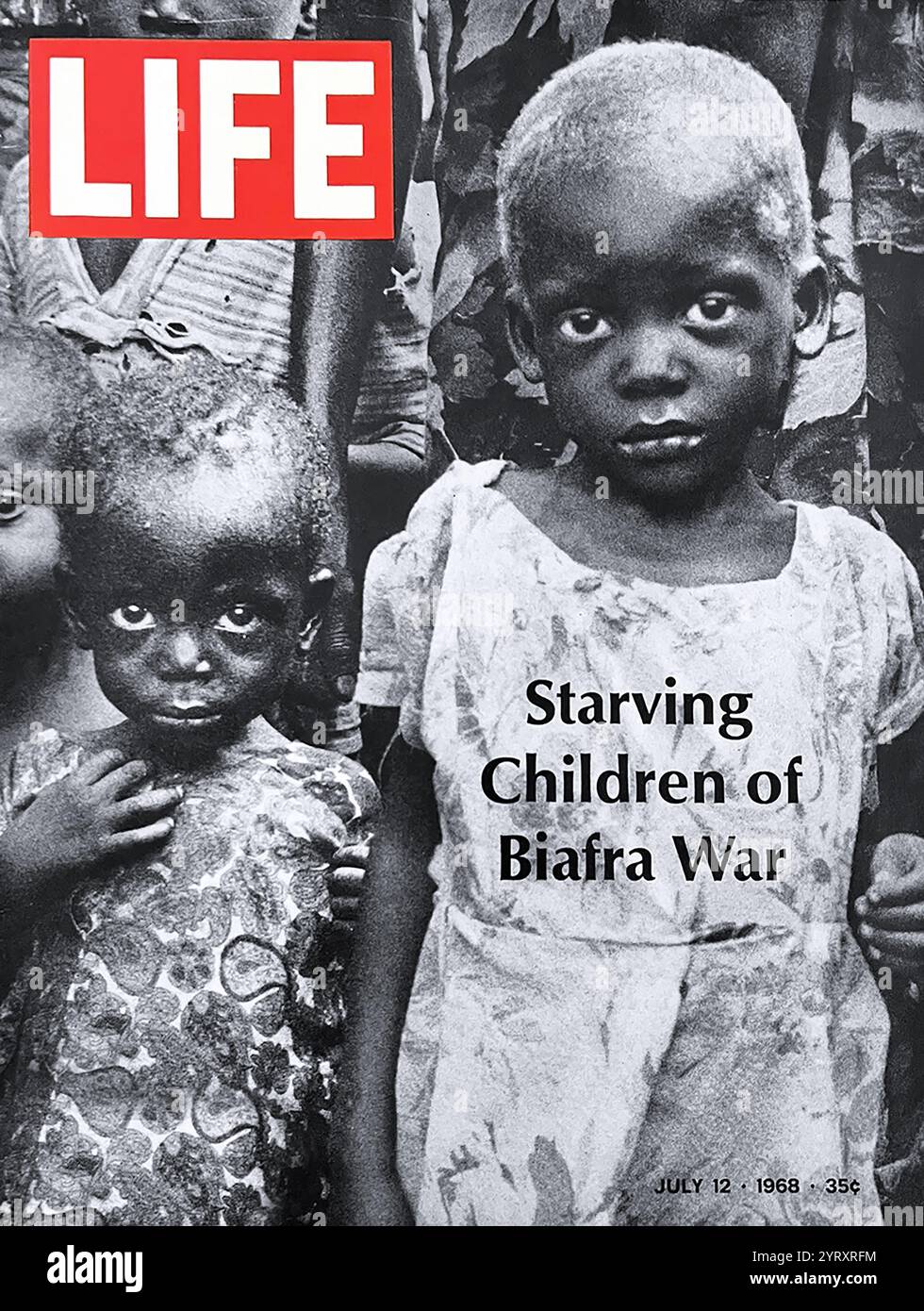 Life Magazine media coverage of the Biafran Famine during the he Nigerian Civil War (1967 ? 15 January 1970), known as the Biafran War, was fought between Nigeria and the Republic of Biafra, a secessionist state which had declared its independence from Nigeria in 1967. Nigeria was led by General Yakubu Gowon, and Biafra by Lieutenant Colonel Chukwuemeka 'Emeka' Odumegwu Ojukwu. The conflict resulted from political, ethnic, cultural and religious tensions which preceded the United Kingdom's formal decolonisation of Nigeria from 1960 to 1963. Immediate causes of the war in 1966 included a milita Stock Photohttps://www.alamy.com/image-license-details/?v=1https://www.alamy.com/life-magazine-media-coverage-of-the-biafran-famine-during-the-he-nigerian-civil-war-1967-15-january-1970-known-as-the-biafran-war-was-fought-between-nigeria-and-the-republic-of-biafra-a-secessionist-state-which-had-declared-its-independence-from-nigeria-in-1967-nigeria-was-led-by-general-yakubu-gowon-and-biafra-by-lieutenant-colonel-chukwuemeka-emeka-odumegwu-ojukwu-the-conflict-resulted-from-political-ethnic-cultural-and-religious-tensions-which-preceded-the-united-kingdoms-formal-decolonisation-of-nigeria-from-1960-to-1963-immediate-causes-of-the-war-in-1966-included-a-milita-image634299560.html
Life Magazine media coverage of the Biafran Famine during the he Nigerian Civil War (1967 ? 15 January 1970), known as the Biafran War, was fought between Nigeria and the Republic of Biafra, a secessionist state which had declared its independence from Nigeria in 1967. Nigeria was led by General Yakubu Gowon, and Biafra by Lieutenant Colonel Chukwuemeka 'Emeka' Odumegwu Ojukwu. The conflict resulted from political, ethnic, cultural and religious tensions which preceded the United Kingdom's formal decolonisation of Nigeria from 1960 to 1963. Immediate causes of the war in 1966 included a milita Stock Photohttps://www.alamy.com/image-license-details/?v=1https://www.alamy.com/life-magazine-media-coverage-of-the-biafran-famine-during-the-he-nigerian-civil-war-1967-15-january-1970-known-as-the-biafran-war-was-fought-between-nigeria-and-the-republic-of-biafra-a-secessionist-state-which-had-declared-its-independence-from-nigeria-in-1967-nigeria-was-led-by-general-yakubu-gowon-and-biafra-by-lieutenant-colonel-chukwuemeka-emeka-odumegwu-ojukwu-the-conflict-resulted-from-political-ethnic-cultural-and-religious-tensions-which-preceded-the-united-kingdoms-formal-decolonisation-of-nigeria-from-1960-to-1963-immediate-causes-of-the-war-in-1966-included-a-milita-image634299560.htmlRM2YRXRFM–Life Magazine media coverage of the Biafran Famine during the he Nigerian Civil War (1967 ? 15 January 1970), known as the Biafran War, was fought between Nigeria and the Republic of Biafra, a secessionist state which had declared its independence from Nigeria in 1967. Nigeria was led by General Yakubu Gowon, and Biafra by Lieutenant Colonel Chukwuemeka 'Emeka' Odumegwu Ojukwu. The conflict resulted from political, ethnic, cultural and religious tensions which preceded the United Kingdom's formal decolonisation of Nigeria from 1960 to 1963. Immediate causes of the war in 1966 included a milita